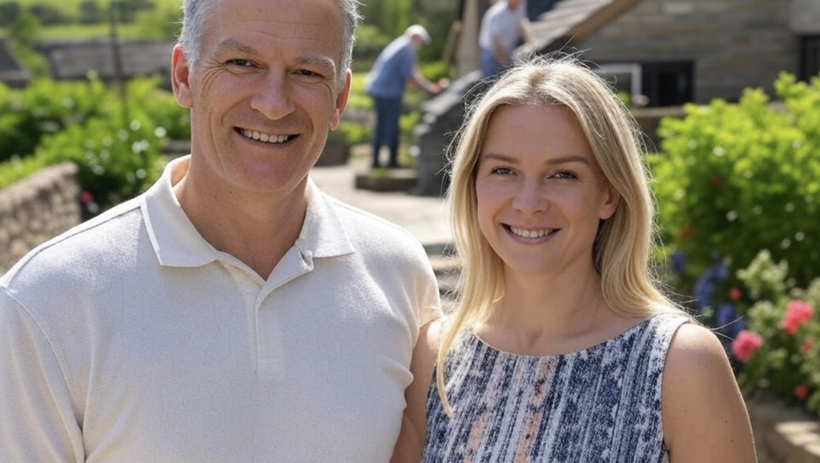







What would the process be if I wanted to apply for planning permission to build a house on the land?
If you want to apply for planning permission to build a house on the land, the process would typically involve the following steps: 
1. Pre-application advice: Before submitting a planning application, it's often advisable to seek pre-application advice from the local planning authority. This can help you to understand the planning policies and regulations that will apply to your proposal, and can also highlight any potential issues or concerns.
2. Develop your proposal: Based on the pre-application advice, you can develop your proposal for the house and any associated works, such as access, parking, and landscaping. You may want to consult with a planning consultant or architect to help you develop your plans and ensure they are in line with the local planning policies and regulations.
3. Submit your application: Once you have developed your proposal, you can submit a planning application to the local planning authority. This will typically involve completing an application form, providing plans and drawings of the proposal, and paying a fee.
4. Public consultation: The local planning authority will usually carry out a public consultation on the proposal, which may involve notifying nearby residents and inviting comments on the application.
5. Assessment: The local planning authority will assess the planning application against the relevant policies and regulations, and will consider any comments received during the public consultation. They may also seek advice from other bodies, such as the Environment Agency, before making a decision.
6. Decision: The local planning authority will either grant or refuse planning permission for the proposal. If planning permission is granted, it may be subject to conditions, such as the need for certain works to be carried out, or limitations on the use of the land.

It's important to note that the process for applying for planning permission can be complex, and may take several months to complete. It's often advisable to seek professional advice and assistance to help you navigate the process and ensure that your application is more likely to be approved.
Would the type of planning permission granted to that particular piece of land have any impact on the resale value of the land?
Yes, the type of planning permission granted to a piece of land can have an impact on its resale value. Planning permission can increase the value of a property or land, as it can provide certainty and clarity on what can be built or used on the land, and can make the land more attractive to potential buyers or developers.
For example, if planning permission is granted for a house to be built on the land, the land may be more valuable than if planning permission was granted for a smaller development or for agricultural use. However, the value of the land will also depend on other factors such as location, access, size, zoning, and demand in the local property market.
It's worth noting that planning permission is typically only valid for a set period of time, and will usually need to be renewed if it has not been implemented within a certain timeframe. This may also affect the value of the land, as it can create uncertainty around the ability to develop or use the land in the future.
What is "zoning"?
Zoning refers to the practice of dividing land into different zones or districts based on their intended use. This is typically done by local planning authorities in order to regulate land use and development within a particular area.
Zoning can be used to designate areas for different uses, such as residential, commercial, industrial, or agricultural. It can also be used to regulate the height, size, density, and appearance of buildings and structures within each zone.
The aim of zoning is to promote sustainable development, protect the environment, and ensure that different land uses are compatible with each other. It can also help to reduce conflicts between different land uses and to provide certainty and clarity for landowners, developers, and other stakeholders.
Zoning is typically set out in a local development plan or a zoning ordinance, and can be enforced through planning permissions and other regulatory mechanisms.
gary@nrgdigital.co.uk
Is there a way I can find out about zoning in this particular area?
Yes, you can find out about zoning in a particular area by contacting the local planning authority. In the case of Crook, County Durham, the local planning authority is Durham County Council.
You can visit their website at www.durham.gov.uk and navigate to the planning section, where you can find information on the local development plan and zoning regulations. You can also contact their planning department directly to request information on zoning for a particular area, or to seek advice on planning matters.
Alternatively, you can access zoning information through the UK government's Planning Portal at www.planningportal.co.uk. The portal provides information on planning policies and regulations, as well as access to planning application forms and guidance.
What sort of costs are there in apply for planning permission to build a house?
The costs of applying for planning permission to build a house can vary depending on a number of factors, such as the scale and complexity of the proposal, the location of the land, and the fees charged by the local planning authority.
In general, you can expect to pay the following costs when applying for planning permission to build a house:
1. Planning application fee: This is a fee charged by the local planning authority for processing your planning application. The fee varies depending on the scale and complexity of the proposal, but for a house, the fee in England is currently £462 for a full planning application, and £206 for a householder planning application.
2. Professional fees: You may need to engage professional consultants, such as architects, surveyors, or planning consultants, to help you prepare and submit your planning application. The fees for these services can vary depending on the complexity of the proposal and the experience of the consultant.
3. Legal fees: You may also need to engage a solicitor to help you with legal aspects of the planning process, such as negotiating legal agreements or responding to objections from third parties.
4. Other costs: There may be other costs associated with your planning application, such as the cost of preparing drawings and plans, advertising costs for public notices, and fees for environmental impact assessments or other studies that may be required.
It's important to note that these costs can add up quickly, and can be substantial for larger or more complex proposals. It's therefore advisable to seek professional advice and assistance to help you navigate the planning process and manage your costs effectively.
Could you explain this in more detail?
Certainly. When you submit a planning application to the local planning authority, they will assess your proposal against their planning policies and regulations. This assessment will typically consider a range of factors, such as the impact of the proposal on the local environment, the availability of infrastructure and services, and the potential for the proposal to create any conflicts with neighbouring properties or land uses.
As part of this assessment, the local planning authority may also carry out a public consultation on the proposal, which may involve notifying nearby residents and inviting comments on the application. This is done to ensure that the local community has a chance to express their views on the proposal and to provide feedback to the local planning authority.
In some cases, the local planning authority may receive objections to the planning application from third parties, such as neighbours or local interest groups. These objections may be based on a range of factors, such as concerns over the impact of the proposal on the local environment, the character of the area, or the amenity of neighbouring properties.
When considering objections to a planning application, the local planning authority will assess the validity of each objection and consider the issues raised in their decision-making process. This may involve negotiating with the applicant to address any concerns or seeking further information or advice from other parties, such as environmental or heritage consultants.
If the local planning authority decides to grant planning permission for the proposal, they may attach conditions to the permission to address any concerns raised in the assessment process. These conditions may require the applicant to carry out certain works or to limit the use of the land in a particular way.
It's important to note that the planning process can be complex and time-consuming, and can vary depending on the nature of the proposal and the policies and regulations of the local planning authority. It's often advisable to seek professional advice and assistance to help you navigate the process and ensure that your application is more likely to be approved.
On average how long does the process take start to finish (say in the case of applying for planning permission to build a house?)
The time it takes to obtain planning permission to build a house can vary depending on a number of factors, such as the complexity of the proposal, the policies and regulations of the local planning authority, and the number of objections or queries raised during the assessment process.
On average, the process of obtaining planning permission to build a house can take between 8-16 weeks for a standard application, and up to 13 weeks for a householder application (which is for minor developments or modifications to an existing property). However, the process can sometimes take longer, particularly for larger or more complex proposals, or where there are objections or queries raised during the assessment process.
It's worth noting that the planning process typically involves a number of stages, such as pre-application discussions, the submission of planning application, consultation with neighbours and stakeholders, and the assessment and determination of the application. Each of these stages can take time, and delays can occur if additional information or revisions are required.
Overall, it's advisable to allow plenty of time when applying for planning permission to build a house, and to seek professional advice and assistance to help you navigate the process and ensure that your application is more likely to be approved.
Good. Can you explain how long and how much £'s this part of the process takes / costs please?
Pre-application advice: Before submitting a planning application, it's often advisable to seek pre-application advice from the local planning authority. This can help you to understand the planning policies and regulations that will apply to your proposal, and can also highlight any potential issues or concerns.
The costs and time involved in seeking pre-application advice from the local planning authority can vary depending on the local planning authority and the complexity of the proposal.
Many local planning authorities offer pre-application advice services, which can provide guidance and advice on the planning policies and regulations that will apply to your proposal. The cost of this service can vary, but is typically in the range of £50 to £500, depending on the local planning authority and the level of advice required.
The time it takes to receive pre-application advice can also vary depending on the local planning authority and the complexity of the proposal. In some cases, pre-application advice can be provided within a few days or weeks, while in other cases it may take several weeks or months.
It's worth noting that seeking pre-application advice can be a valuable investment, as it can help you to identify any potential issues or concerns with your proposal early on in the process. This can help you to refine your proposal and ensure that it is more likely to be approved when you submit your planning application.
Overall, it's advisable to seek pre-application advice from the local planning authority before submitting a planning application, as this can help you to save time and money in the long run, and can improve the likelihood of a successful planning application.
I’d like to continue with the discussion in this thread please in particular in relation to planning permission if I gain title to this land?
Planning permission is a requirement in the UK for certain types of development or change of use of land or buildings. The specifics can vary somewhat by location due to local policies. 
Here are some general points about planning permission:
New Buildings: Planning permission is generally needed for the construction of new buildings.
Change of Use: If you intend to change the use of a piece of land or a building, you'll likely need planning permission.
Extensions: Significant extensions to existing buildings usually require planning permission, although some small extensions are considered "permitted development" and don't require a formal application.
Permitted Development Rights: Some minor changes and developments may not require planning permission due to being classified as "permitted development". However, the specifics can be complex and vary by location, so it's always a good idea to check with your local planning authority.
Listed Buildings & Conservation Areas: If the land or building is listed or in a conservation area, you'll have additional restrictions and may need to apply for special permission for any alterations.
Local Development Plan: Your local authority will have a local development plan that outlines their strategy and policies for land use in your area. It's worth consulting this document as part of your planning process.
Pre-Application Enquiry: Many local planning authorities offer a pre-application enquiry service where you can receive feedback on your plans before you make a formal application. There may be a fee for this service.
If you're considering a development that requires planning permission, it's generally advisable to work with an architect or a planning consultant. They'll be able to guide you through the process and increase the chances of your application being successful.
I hope this helps, and if you have any specific questions about planning permission, please let me know!
What about if I simply want to use the land as a garden and allotment for growing vegetables?
Using land as a garden or allotment for personal use generally doesn't require planning permission in the UK. Changing the use of land to an allotment or garden is typically considered 'permitted development' under UK planning laws.
However, there are a few exceptions and considerations to keep in mind:
Building Structures: If you want to build any structures on the land, such as a greenhouse, shed, or summer house, you might need planning permission depending on the size and location of the structure.
Protected Areas: If the land is in a protected area, such as a Conservation Area, a National Park, an Area of Outstanding Natural Beauty, or a World Heritage Site, additional restrictions may apply.
Listed Buildings: If the land is associated with a listed building, there may be additional restrictions or requirements.
Access: If creating an allotment or garden involves creating new access onto a road, you might need planning permission.
Fencing/Walls: Erecting or adding to fences, walls and gates might require planning permission, especially if the land borders a public highway, or the height exceeds certain limits.
Commercial Use: If the garden or allotment is used commercially, for example selling the produce, it might be considered a change of land use requiring planning permission.
In all cases, it's a good idea to check with your local council's planning department before starting work. They can provide guidance tailored to your specific circumstances.
Could you give more specifics relating to this point? In particular the dimensions (in the UK) ? Building Structures: If you want to build any structures on the land, such as a greenhouse, shed, or summer house, you might need planning permission depending on the size and location of the structure.
As of my knowledge cutoff in September 2021, in the UK, outbuildings such as sheds, greenhouses, and summerhouses are considered to be "permitted development", not needing planning permission, subject to the following limits and conditions:
No outbuilding on land forward of a wall forming the principal elevation.
Outbuildings and garages to be single storey with maximum eaves height of 2.5 metres and maximum overall height of four metres with a dual pitched roof or three metres for any other roof.
Maximum height of 2.5 metres in the case of a building, enclosure, or container within two metres of a boundary of the curtilage of the dwellinghouse.
No verandas, balconies or raised platforms (a platform must not exceed 0.3 metres in height)
No more than half the area of land around the "original house"* would be covered by additions or other buildings.
In National Parks, the Broads, Areas of Outstanding Natural Beauty and World Heritage Sites, the maximum area to be covered by buildings, enclosures, containers, and pools more than 20 metres from the house to be limited to 10 square metres.
On designated land, buildings, enclosures, containers, and pools at the side of properties will require planning permission.
Within the curtilage of listed buildings, any outbuilding will require planning permission.
*The term "original house" means the house as it was first built or as it stood on 1 July 1948 (if it was built before that date).
Please note that these are general guidelines and it's always recommended to consult with your local planning authority before proceeding with any development. Also, building regulations are subject to change, so please ensure you have the most up-to-date information.